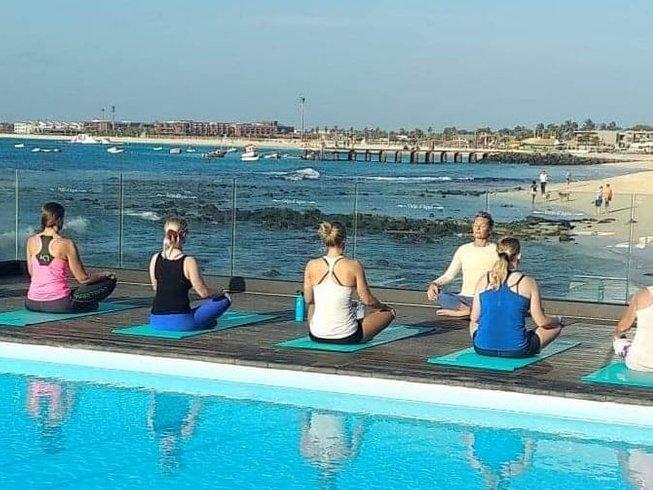Search for yoga retreats
Discover yoga retreats, holidays, and courses from worldwide.
Do you find yourself wide awake at night, longing for a peaceful slumber? You're not alone. Millions struggle with sleep disturbances, leaving them drained and foggy-brained throughout the day. Thankfully, there are natural solutions to reclaim your sleep sanctuary, and yoga offers a treasure trove of powerful tools.
This article explores the magic of yogic breathing for better sleep, but before we dive in, let's delve into the significance of restful slumber.
Why Sleep Matters

Sleep isn't just a period of inactivity; it's a cornerstone of well-being. Quality sleep is linked to:
- Maintaining a healthy weight: Sleep regulates hormones that influence hunger and satiety. Poor sleep disrupts this balance, making it harder to manage weight.
- Boosting brain function: Sleep fuels focus, memory, and problem-solving abilities. You'll make sharper decisions and navigate stress with greater ease.
- Enhancing athletic performance: Ever wonder why athletes prioritize sleep? It improves reaction time, accuracy, and overall physical performance.
- Reducing the risk of chronic diseases: Consistent quality sleep helps regulate blood pressure and heart rate, lowering the risk of heart disease and type 2 diabetes.
- Supporting mental health: Insomnia and sleep apnea are often linked with anxiety and depression. Improving sleep can alleviate symptoms and contribute to better mental well-being.
Yoga Unveils the Secrets of Sleep
Yoga is more than physical postures; it's a holistic practice that integrates breathwork (pranayama) for relaxation and stress management. Here are seven yogic breathing exercises to help you drift off peacefully:
- The 4-7-8 Technique: You'll inhale for 4 seconds, pause for 7 seconds, and then exhale slowly for 8 seconds. Repeat for 4-8 cycles to quiet the mind and promote relaxation.
- Diaphragmatic Breathing (Belly Breathing): Unlike shallow chest breathing, diaphragmatic breathing utilizes the diaphragm muscle for deeper breaths. This technique is particularly helpful for those with sleep difficulties.
- Visualizing Breath: Engage your mind and body by visualizing the breath traveling through you with each inhale and exhale. This meditative practice promotes relaxation and sleepiness.
- Alternating Nostril Breathing: This technique balances the brain's hemispheres, promoting a sense of calm. Breathe in through one nostril, hold, then exhale through the other nostril. Repeat, alternating sides.
- Meditative Breath: Combine mindfulness meditation with deep breathing to quiet the mind and body. Inhale and exhale slowly, focusing on the sensation of your breath for 10 minutes.
- Three-Part Yogic Breath: This exercise deepens relaxation by focusing on different sections of the lungs as you inhale and exhale.
- Bhramari Pranayama (Humming Bee Breath): This traditional technique involves humming while exhaling, creating a calming vibration that reduces stress and promotes relaxation.
Beyond the Breath: Optimizing Your Sleep Environment
In addition to breathing exercises, consider these tips for a more restful night's sleep:
- Create a sleep haven: Aim for a cool, dark, and quiet bedroom environment.
- Establish a sleep schedule: Go to bed and wake up at consistent times to regulate your body's natural sleep-wake cycle.
- Limit daytime napping: Short power naps (around 30 minutes) are okay, but long naps can disrupt nighttime sleep.
- Fuel your body wisely: Avoid heavy meals and caffeine close to bedtime.
- Embrace movement: Regular exercise promotes better sleep, but avoid vigorous activity right before bed.
- Aromatherapy: Lavender and chamomile essential oils can create a calming atmosphere.
- Unwind with yoga or meditation: Yoga postures and meditation techniques can significantly reduce stress and prepare your body for sleep.
Deepen Your Practice: Yoga Retreats and Teacher Training

Yoga retreats offer an immersive experience to learn new techniques and deepen your practice. Imagine yourself surrounded by serene landscapes, practicing yoga under the open sky, and learning from experienced teachers. Yoga retreats can be a transformative experience, not just for sleep improvement, but for overall well-being.
For those who wish to share the gift of yoga with others, yoga teacher training programs provide a comprehensive curriculum to become a certified yoga instructor. Imagine guiding others on their own journeys to a good night's sleep and a healthier lifestyle.
Sweet Dreams Await
By incorporating these yogic breathing techniques and sleep hygiene practices into your routine, you can unlock the door to a restful night's sleep. Remember, consistency is key. With dedication, you'll be well on your way to waking up feeling refreshed and ready to embrace each day. Should you find yourself needing further guidance, consider seeking professional help from a sleep specialist or yoga therapist.
Namaste!
Craving More Stories?
Join our ShopYogaRetreats newsletter for the latest updates on thrilling
destinations and inspirational tales, delivered straight to your inbox!
We value your privacy. Your email address will never be shared or published.
 English
English Deutsch
Deutsch Français
Français Nederlands
Nederlands Español
Español

